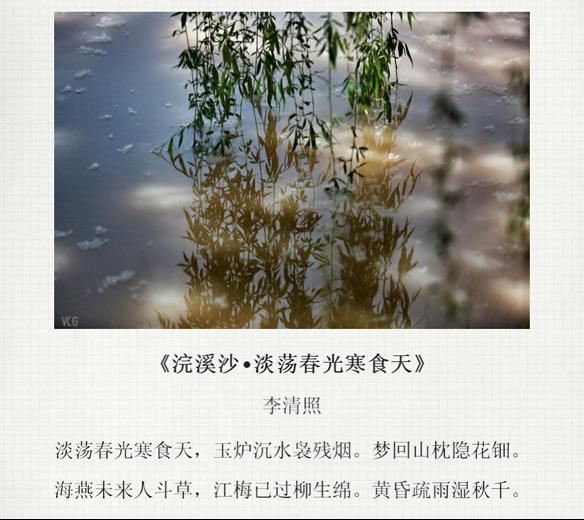
Silk - Washing Stream
Spring sheds a mild and wild light on Cold Food Day;
Jade burner spreads the dying incense like a spray.
Walking, I find my hairpin under pillow stray.
The swallows not yet come, a game of grass we play;
Willow down wafts while mume blossoms fade away.
In drizzling rain at dusk the garden swing won't sway.
huàn xī shā · dàn dàng chūn guāng hán shí tiān
浣溪沙·淡荡春光寒食天
sòng · lǐ qīng zhào
宋·李清照
dàn dàng chūn guāng hán shí tiān。
淡荡春光寒食天。
yù lú chén shuǐ niǎo cán yān。
玉炉沉水袅残烟。
mèng huí shān zhěn yǐn huā diàn。
梦回山枕隐花钿。
hǎi yàn wèi lái rén dǒu cǎo,
海燕未来人斗草,
jiāng méi yǐ guò liǔ shēng mián。
江梅已过柳生绵。
huáng hūn shū yǔ shī qiū qiān。
黄昏疏雨湿秋千。
Silk—Washing Stream is a poem by Song Dynasty poet Li Qingzhao (1084-1155), one of the leading female poets of the time.
The Cold Food Festival or Hanshi Festival (寒食节, hán shí jié), as mentioned in the poem, is a traditional Chinese holiday celebrated one day before the Qingming Festival. On that day, people only eat cold food. It was not until the Qing Dynasty (1644-1911) that the practice of Hanshi was replaced by Qingming.
《浣溪沙》是宋代词人李清照(1084-1155)的一首词,她是当时著名女词人之一。词中提到的寒食节,是清明节前一天庆祝的中国传统节日。这一天,人们只吃冷食。直到清朝(1644-1911),寒食节的习俗才被清明所取代。